5 Ways for Managers to Gain More Time – Time Management for Managers

Time Management for managers is a real challenge. The demands on your time and workload only seem to increase. Your boss and your team look to you to solve the inevitable problems that come up – all demanding your time.
Time always seems to be against you.
I have 5 ways for managers to gain more time. Implement these well and you could leave each day at 5 while still delighting your manager through to spending freed up time to deliver more bringing your next promotion forward.
Implementing each of these 5 Ways for managers to gain more time will make a significant difference to your working day and help your career progress.
5 Ways for Managers to Gain More Time
- Prioritise Ruthlessly using these 8 time management techniques
- Delegate Problems Not Tasks
- Make Meetings Valuable or Bin Them
- Encourage Decision Making Across the Team
- Create More Leaders in Your Team
Watch on YouTube
Listen on Podcast
So the first time management for managers technique is
Improving how you prioritise your tasks and projects
Everyone says to prioritise better. The challenge is always how to prioritise better.
Prioritise what your team is working on as much as what you are working on personally. Here are 8 different time management techniques for managers to help you gain more time and improve prioritisation:
1 Use an Urgency vs Importance check against each task or project – do the important tasks first and try not to do non-important and non-urgent tasks.
2 Check task or project alignment with the team and company goals. The more aligned the more important it is to complete.
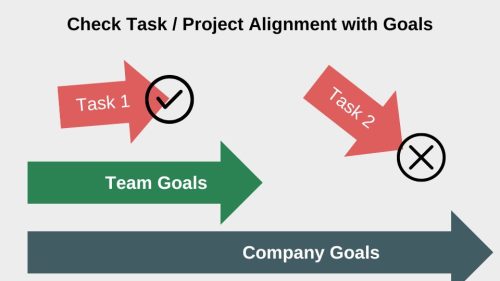
3 Keep asking why until you understand the purpose, context and value of a given task. Asking why helps you understand how important and urgent a task or request is. It is amazing how much time you can save by asking why
4 Get great at communicating and managing expectations with all your stakeholders. Good communication means you reduce the amount of time spent communicating. Good expectation management means you spend less time dealing with unhappy stakeholders.
5 Plan carefully – doing the right task at the right time with the right resources is much quicker than out of sync or with the limited resources etc.
6 Know when and how to ask for help – this reduces the time spent worrying about getting what you need to get done
7 Get better at saying no to non-important tasks and other requests which don’t add enough value. Being good and diplomatic at saying no reduces workloads without upsetting stakeholders.
8 Invest in the right tools to do tasks faster – the right tools or even reasonable tools to reduce time on repetitive tasks can make a massive difference across a team
Prioritisation and time management is a lot more than an intellectual exercise. Time management is an exercise in discipline and self-control too. We are all tempted to do the tasks we can, that we know, or we enjoy first. Resist this temptation and do the most important tasks first. Keep focused on your top priority until you have completed it, then move on to the next one.
Keep the main thing the main thing – essential to good time management.
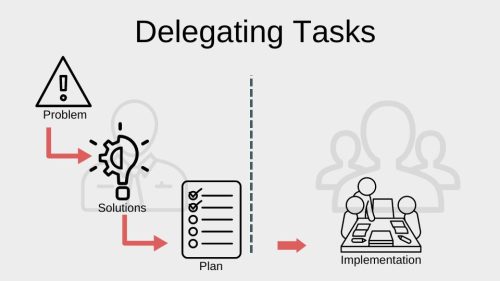
Delegate problems not tasks – the second time management technique for managers
Imagine you have a problem that needs to be solved.
To delegate tasks you have to work out a solution, then plan the steps, tasks or activities that need to be done to implement that solution. Only then can you delegate the task with the expectation of getting back what you want. This solutioning and planning stage take time, sometimes a lot of time. Then you need to communicate each task carefully and support the implementation.
Compare this to delegating a problem.
The most important task is to work out and define the question or problem that needs solving. Once the problem is clear, ask team members to create a solution. You might need to coach the team members more during the solutioning phase, yet this is likely to be a lot less time consuming than doing it yourself.
The real benefits come over time.
If you delegate tasks, you will doing the solutioning part into the future. If you delegate problems, the level of coaching will decrease as team members develop their skill at solving this problem. In addition you will have a more skilled and motivated team, with more people that can solve this type of problem. This will save you a lot of time going forward.
Of course you can’t always delegate a problem. Judge when you can delegate a task and delegate a problem. Over time you will find you can delegate a much wider range of problems. You save a lot of your time and develop your team in the process.
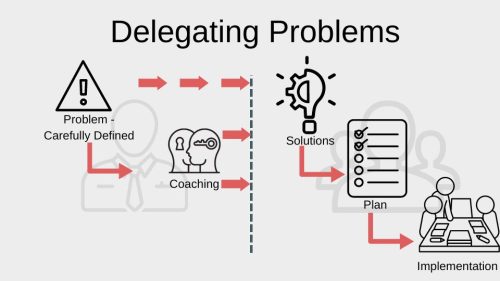
Make Meetings Valuable or Bin Them – the third way managers gain more time
Per Forbes, 50% of time spent in meetings is not well spent.
How many meetings do you organise or attend over which you have a lot of influence or control? Quite a few I imagine.
Write a list of all the meetings you organise and attend. Against each entry, write down the purpose of the meeting. i.e. examples being
- Information sharing
- Problem Solving
- Decision Making
- Planning
- Increasing team focus on goals
Any meetings which don’t have a clear purpose either cancel the meeting or improve the purpose of the meeting.
Provide an agenda before the meeting so attendees understand what is being covered and they can start thinking about their contribution in each area. Be strict on who should attend each meeting – only those contributing should be attending.
Use meeting pre-reads to communicate as much information as possible. Use the meeting time for debate, discussion, problem solving and decisions. Good meetings should result in the goal of the meeting being achieved and further actions for some or all participates.
Capture the meeting’s main points in meeting minutes and share these minutes with the team to keep them informed. This reduces having extra attendees for information sharing purposes while still providing them with the relevant information.
Finally, book in shorter meetings. A meeting scheduled for an hour always seems to last an hour. If it is booked for 45 minutes, and you push to achieve the meeting goals, everyone speeds up a little bit. You save 15 minutes.
Everyone gains more time and each meeting becomes valuable to attend.

Encourage Decision Making Across the team – the Fourth time management technique for managers gain more time
Everyone makes decisions in their job. The impact of decisions made by team members are usually low. The manager’s decisions usually have a larger impact and so on through the organisation.
A time trap that many managers fall into is expecting their team members to consult them on decisions being made or accept staff members asking them to make the decisions for them. This lowers the risk for the team member but doesn’t help your time management. I have made both mistakes myself.
To create more time as a manager, get your team members to make appropriate decisions. This requires you to provide them safety to make decisions, avoid making those decisions for them and coaching them to make decisions as needed.
A key step is to define what decisions can be made by which positions within your team. Create a document outlining the decisions permissible into sensible categories – some examples include
- Cash spend and spend against budgets,
- Contractual obligations with customers and suppliers
- Types of decision that can be made – such as hiring, contractual obligations, buying
And any other area in which decisions are repeatedly made. A decision authority document is a great starting point in providing safety for your staff to make decisions.
When a team member should be making a decision and the impact or cost is within their authority, encourage them to make the decision. Be very conscious of what you do. The minute you make a decision for them, them will come back time and time again. Coach them to make a decision and they will gain confidence in making the decision themselves without needing to run it past you.
Finally, don’t punish poor decisions. If you do, team members will stop making decisions. Instead, coach that team member and others if appropriate how to make a better decision in that circumstance.
Encourage appropriate decision making across your team – it will save you a lot of time.
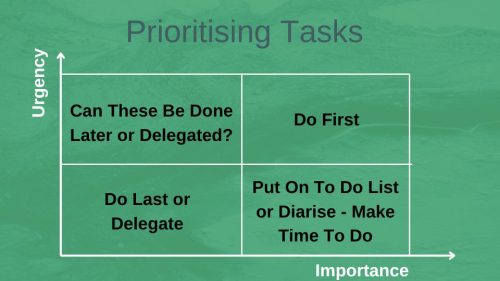
The fifth way for managers to gain more time is to create more leaders in the team
Having more leaders within the team helps share your leadership burden, which gives you more time and energy to use to move your own career forward.
Every team member can act as a leader, can practice leadership skills, regardless of their job title.
Leaders:
- Help solve problems
- Challenge the status quo, looking for improvements
- Confident to make decisions within their remit
Leaders are agents of change and improvement. Team members practicing leadership skills are great sources of support for the manager of the team.
Encouraging management and leadership skills helps you build high performing teams and helps you move your career forward through good succession planning.
Work to create more leaders in your team to help you gain more time and reduce the pressure and stress of management.
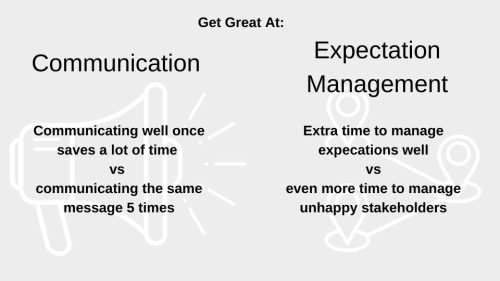
In summary
Implement as many of these actions to gain more time for managers as practical. They all work. Time management for managers is even more important as you have to manage time for yourself and your team.
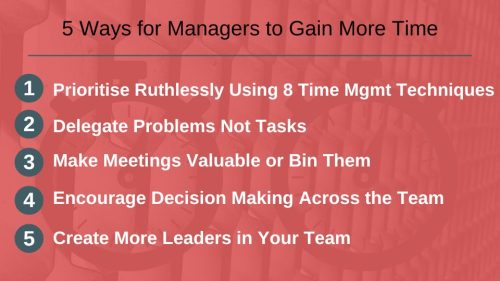

As you go through your career you come across many tactics for managing your time better. You only have so much time so making the most of the time you do have is important. As you become responsible for other’s time as well as your own, time management becomes vital.
These time management strategies work can work quickly and work time and time again over the long term. Use them to free up a lot of your personal time as a manager, making you more effective and giving you space to enjoy more non-work time or to move your career forward faster.






